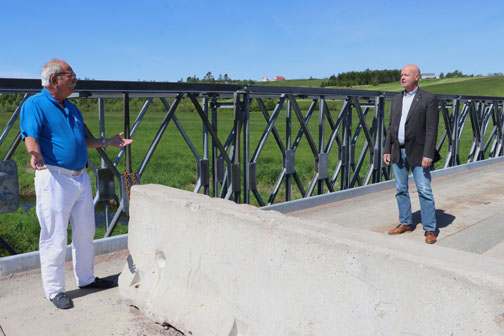
On today’s CHMA daily news:
- Amherst Mayor David Kogon on Friday’s Atlantic bubble
- Reviewing contract policing in Canada
- Atlantic Salmon numbers continue to decline.
- Worldwide COVID-19 cases hit 10 million
- and the New Brunwick COVID update.
TRANSCRIPT:
The province reported no new cases of COVID-19 for the fifth day in a row on Sunday.
There are just 5 remaining active cases in New Brunswick.
Two people are still in hospital, with one in intensive care.
Over the past week, testing in New Brunswick fell below the minimum set by Chief Medical Officer of Health Jennifer Russell.
The province conducted 2264 tests over the past 7 days.
Russell said in early May that the province was trying to maintain 2300 tests per week.
People are still being asked to get tested if they have just one symptom of COVID-19.
World hits over 10 millions reported cases of COVID-19
Worldwide, the number of coronavirus cases topped 10 million over the weekend.
Over 500,000 have died with COVID-19, globally.
The US has about one quarter of global cases, with 2.59 million cases, and 128 thousand deaths attributable to the virus.
The US reported over 40,000 new cases on Sunday.
There were only 218 new cases reported in Canada on Sunday, mostly in Ontario and Alberta.
But that number doesn’t include cases from Quebec, which announced it would stop reporting daily cases last week.
Within a day, the province reversed that decision.
Quebec will resume daily reporting today.
David Kogon on the Atlantic bubble
Amherst Mayor David Kogon says the Atlantic Bubble, which starts this Friday, is a big step forward for the mental well being of a lot of people.
Kogon says for the past three months there’s been family and friends on both sides of the border that couldn’t get together.
The Amherst mayor has been lobbying for a local or provincial bubble for awhile, even arranging an in-person meeting with Sakcville Mayor John Higham at the border to discuss the issue.
Kogon says the bubble is needed to reestablish economic connections between Amherst, Sackville and southeastern New Brunswick.
But he has heard some worries voiced by residents about further easing of border restrictions with the rest of Canada.
Click to listen:
“The concerns that I’ve heard raised are, if it were to open further, because people locally have a little fear about the numbers that we’re hearing coming out of Quebec and Ontario, and obviously, the United States. So opening that up to those provinces and to the United States, for from an economic perspective would be very, very positive. However, from a health perspective, I think there may be some concerns… But just talking about the Atlantic bubble, the numbers are so well controlled in these four provinces, that there really isn’t an increased health risk, in my opinion, by by whether you stay within your province or travel amongst the four.”
The Atlantic bubble is set to begin this Friday, and means that residents of the Atlantic provinces will be able to cross provincial borders without the requirement for 14 days of self-isolation.
Premier Blaine Higgs says that while reopening to the rest of the country has been discussed for 14 days after July 3rd, the Premiers have not yet settled on a date.
Examining the RCMP’s role in contract policing
The federal government is reviewing the RCMP’s role in regional and municipal policing.
The review comes as the RCMP faces renewed allegations of racism and the use of excessive force in the shooting death of Rodney Levi in northern New Brunswick and the beating of Athabasca Chipewyan First Nation Chief Allan Adam in Fort McMurray, Alberta.
The Mounties have also come under fire for their handling of April’s 13-hour shooting rampage in rural Nova Scotia that left 22 people dead including an RCMP officer.
Last month, Jim Bronskill of the Canadian Press reported on a government memo warning that the RCMP’s contract policing obligations were sapping the force’s effectiveness in fighting organized crime and protecting national security.
Bronskill obtained the confidential memo through an Access to Information request.
The document warned about “growing dissatisfaction” over the costs of local policing as well as officer vacancies raising concerns about community safety.
Bronskill reported that “over 60 per cent of RCMP’s multibillion-dollar budget and over 70 per cent of the force’s officers are assigned to contract policing in 153 municipalities, the three territories, and all provinces but Ontario and Quebec.”
Sackville Town Council voted unanimously to disband its 100-year-old municipal police force in October 2002, among local opposition.
The Moncton Times & Transcript reported that the decision was taken “before a crowd of hundreds of community residents who booed the eight councillors.”
Then-mayor Jamie Smith, who did not have a vote, stepped away from his position chairing the meeting “to tell residents he believed taxpayers couldn’t bear the burden of higher policing costs of the RCMP.”
At the time, Sackville was required to pay 100% of RCMP policing costs which meant a substantial increase over the costs of the municipal force.
The Moncton paper reported that policing costs went from less than $1 million per year, to a total of $1.3 million.
When the contract was renewed in 2012, the federal government agreed to pay 30% of RCMP policing costs, with the town covering the rest.
The new agreement runs until March 31, 2032.
This year, Sackville plans to spend nearly $1.9 million for police services, the largest, single expenditure in its $11.4 million operating budget.
Atlantic salmon numbers continue to decline
Fewer adult salmon are returning to rivers in North America, according to the Atlantic Salmon Federation’s annual State of Wild Atlantic Salmon report.
2019 was one of the three worst years for returns of adult salmon in the 49-years the data has been tracked.
Federation president Bill Taylor said wild atlantic salmon are, “struggling to adapt to warming rivers, changing oceans, and pressure from human development that continues to alter waterways and landscapes.”
According to the report, the Inner Bay of Fundy is the only population of wild Atlantic salmon in Canada listed on the federal Species at Risk Act.
It remains close to disappearing entirely despite recovery efforts.
CHMA Daily News is hosted Mahalia Thompson-Onichino, and produced by Erica Butler, with contributions from Bruce Wark, Geoff de Gannes, and James Anderson.
Are there stories you’d like to hear told on your local airwaves? CHMA wants to help bring you news about your community.
If you have questions or concerns about life in Sackville and the Tantramar area, get in touch with us at news@chmafm.com
Tune in to the CHMA Daily News at 8:30AM, 9:30AM, 12:00PM and 4:00PM.



















